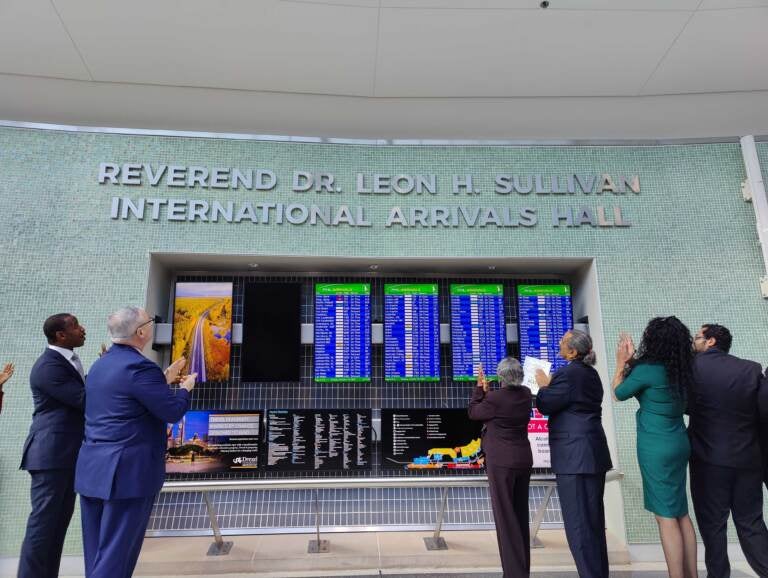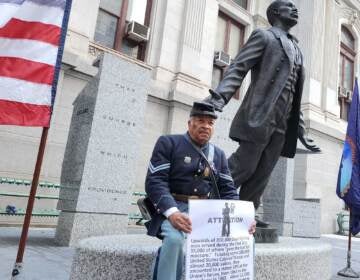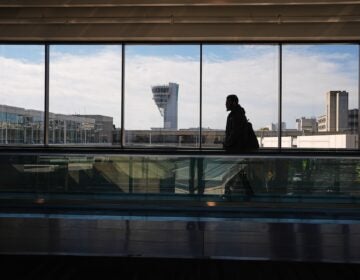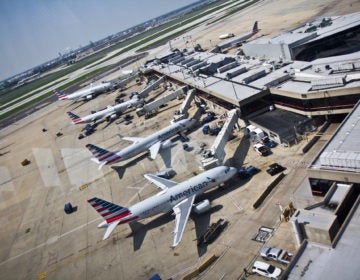Philadelphia airport names international arrivals hall after Dr. Leon Sullivan
The name of the Philadelphia activist for advocated for Black entrepreneurialism and the anti-apartheid movement will greet international travelers coming to Philly.

Mayor Jim Kenney (in blue) and Mable Ellis Welborn (in maroon), board chair of the Leon H. Sullivan Charitable Trust, unveil the new name of the international arrivals hall at the Philadelphia airport. (Peter Crimmins/WHYY)
As international travelers deplane in Philadelphia, they make their way into the arrivals hall with its soaring glass ceiling.
Below a section of text from the Declaration of Independence written on the walls, and next to the Dunkin’ Donuts and Hudson Newsstand, is the name Reverend Dr. Leon H. Sullivan, now the official namesake of the arrivals hall.
Sullivan was a Baptist minister and civil rights activist based in Philadelphia whose work had a global impact. He created the job training organization Opportunities Industrialization Center (OIC) advocating for Black entrepreneurialism to overcome poverty and oppression.

He later developed the Sullivan Principles, a seven-point manifesto toward racial equality that helped overturn South African apartheid. He died at age 78 in 2001.
“He had a special, unique personality: He treated everyone the same whether you were a king or just a regular person,” said Delores Shelton, a board member of a local chapter of the OIC. She attended the airport naming ceremony on Tuesday, two days after what would have been Sullivan’s 100th birthday.

“When we got to Africa he would hold out his hands like an eagle, and we would walk right under his arms,” she said. “He was a marvelous person.”
Sullivan was born in West Virginia, coming to Philadelphia in 1950 as a minister. He became involved in the civil rights movement urging people into “Selective Patronage,” or boycotting companies that would not hire Black people.
The boycott attracted national attention, including the notice of Dr. Martin Luther King who adopted some of Sullivan’s thinking.
In 1968 he founded Progress Plaza, a shopping center on North Broad Street which was America’s first Black-owned shopping center. Sullivan insisted its tenants hire Black workers. The shopping center still exists.
In the 1970s Sullivan joined General Motors as the corporation’s first Black board member, where he developed the Sullivan Principles. That is a seven-point code of conduct regarding Black workers that companies operating in South Africa would have to abide by if they wanted investment from foreign companies. Sullivan convinced several large organizations to adopt his Principles in an effort to abolish apartheid.
“It is highly debatable that no American citizen has done more for economic emancipation locally, nationally or globally than Dr. Sullivan,” said Mable Ellis Welborn, board chair of the Leon Sullivan Charitable Trust.
Those principles would also inform another set of guidelines in another entrenched conflict in Northern Ireland in the 1980s. The MacBride Principles encouraged corporations to disinvest in companies doing business in Northern Ireland which created political or religious divides.
“The peace that you see today and the power-sharing that you see today come directly from the Sullivan Principles, translated into MacBride Principles,” Mayor Jim Kenney said at the naming ceremony. “He has reached every part of this globe. I’m really glad that we’ve done the international terminal, because it really does put a stamp on the fact that he has touched all these countries, as he’s touched all of us.”
Along with the Sullivan name, the arrivals hall also has a permanent case exhibition of Sullivan’s life and work.

The renaming ceremony was organized by the Office of Arts, Culture, and the Creative Economy, the Leon Sullivan Foundation Charitable Trust, and the airport. It is the centerpiece of a series of planned events marking Sullivan’s centenary.
WHYY is your source for fact-based, in-depth journalism and information. As a nonprofit organization, we rely on financial support from readers like you. Please give today.






